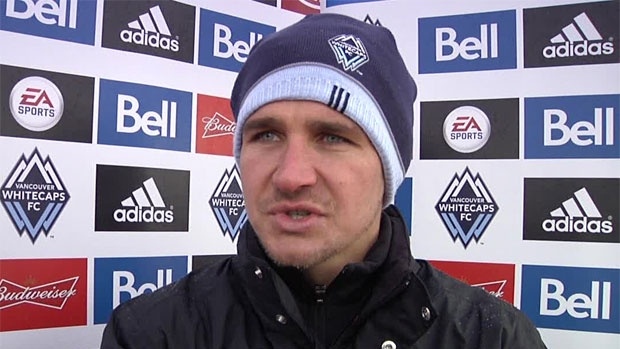Oct 16, 2014
deVos: Whitecaps lucked out when they landed Robinson
Once the Whitecaps fired once up-and-coming manager Martin Rennie is October of 2013, the club turned their focus to finding an experienced manager to lead the team. After several interviews - and at least one rejection - the Whitecaps settled on Rennie's assistant Carl Robinson, however, as TSN's Jason deVos writes, hiring Robinson was the best move the team could have made.
By Jason deVos

Back in late October of last year, the Vancouver Whitecaps began their search for a new head coach. Martin Rennie – who joined the club in August 2011 with a reputation as a young, up and coming manager - had just been fired after failing to lead the club to a second consecutive playoff berth.
The Whitecaps were understandably hesitant to go with another young, up and coming manager; they wanted an experienced coach to guide their early steps in Major League Soccer. Their view was that the club needed someone in charge who not only had experience, but who also knew the league inside and out. MLS has proven to be a difficult league for foreign managers to come to grips with, given the single entity structure and salary cap restrictions that are in place.
After the Chicago Fire snapped up Vancouverite Frank Yallop to be their new coach, the leading candidate for the Whitecaps' job was former United States men's national team coach, Bob Bradley. He certainly fit the bill; over three decades of coaching experience, with stints in charge of the Chicago Fire, New York/New Jersey Metro Stars (now the New York Red Bulls) and Chivas USA, as well as with the U.S. and Egyptian national teams.
But landing Bradley was always going to be a long shot. While the Whitecaps reportedly interviewed a number of coaches, including former Montreal Impact boss Jesse Marsch and Toronto FC head coach Preki, they always had a fallback option; one of Martin Rennie's assistant coaches, Carl Robinson, who wanted the job.
The Whitecaps were very hesitant to appoint Robinson without first exhausting their other options, which is one reason why it took the club the best part of six weeks to make their decision. In the end, after Bradley rejected the Whitecaps' overtures, the club announced that Robinson would become their new head coach.
The decision that Vancouver didn't want to make will prove to be the best thing that ever happened to them.
In a relatively short period of time, Robinson has brought a vision and a direction to Vancouver. They play an attacking brand of soccer, where pace and technique are prized assets. He has a young squad, but has given his young players a chance to play by surrounding them with experienced veterans who are great leaders. Players like Pedro Morales and Mauro Rosales not only lead by example, they also take the time to teach their younger teammates the finer points of the game.
Robinson has his team on the verge of a playoff berth in the difficult MLS Western Conference – and he has done so without a recognized goal scorer in his squad.
The loss of Camilo at the end of last season (before Robinson was hired) coupled with the departure of Kenny Miller to Glasgow Rangers in May left Vancouver without a proven experienced goal scorer. Neither 23-year-old Erik Hurtado nor 24-year-old Darren Mattocks are consistent enough to lead the team week in, week out. This season, they have a combined return of just 11 goals in 56 total games.
At times this season, Robinson has had to rely on unproven youngsters to get the job done. The latest example was 18-year old Kianz Froese, who made his professional debut as a halftime substitute – replacing 19-year old Kekuta Manneh – in the Whitecaps' 1-0 victory in Seattle last weekend. Froese was excellent, and put in a display that belied his age.
Relying on youngsters can be dangerous, because a coach can never be sure if those players can handle the step up to competing against seasoned veterans. But Robinson and his coaching staff have created an atmosphere where young players are considered valued assets, rather than risks that should only be deployed in desperation. This atmosphere has in turn brought out the best in those youngsters; while they can be inconsistent – as all young players can be - they still have the confidence to take the field and play with freedom.
From the very beginning of his tenure, Robinson has been completely transparent about what he is trying to do in Vancouver, even taking the unprecedented step of opening training at all times to the media. His reasoning is clear – he wants people to see him work, so they can make up their minds about whether or not he is good at his job. That is not arrogance; it is the mark of a coach who is confident in his own abilities.
Vancouver has just two games remaining in their regular season schedule – away to the San Jose Earthquakes on Saturday (10:30pm et/7:30pm pt. on TSN) and home to the Colorado Rapids on Oct. 25 – and they might still find themselves just outside the playoff places when it is all said and done. The Portland Timbers are snapping at Vancouver's heels, just one point back with two games remaining, and could surpass the Whitecaps if Vancouver slips up.
But regardless of whether or not the Whitecaps make the playoffs, Carl Robinson's job is safe. In fact, if Vancouver's leadership group is wise, they'll not only keep Robinson, they'll extend his contract.
Because the coach that got the job by default is now an asset that the club simply cannot afford to lose.

